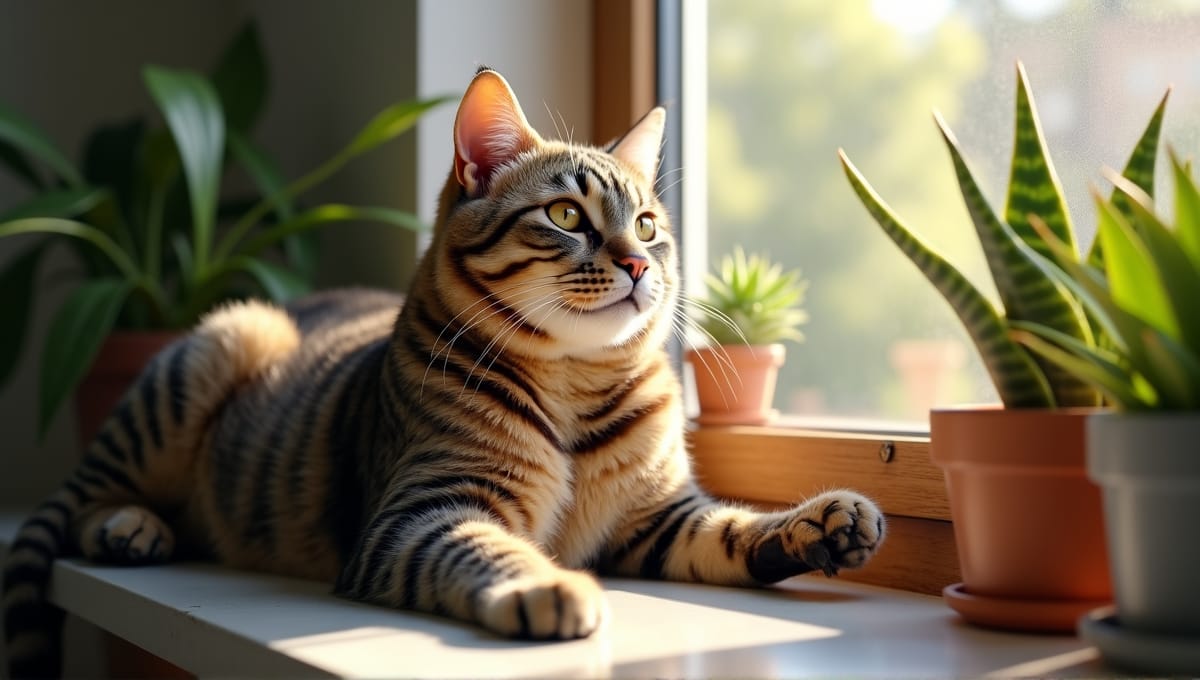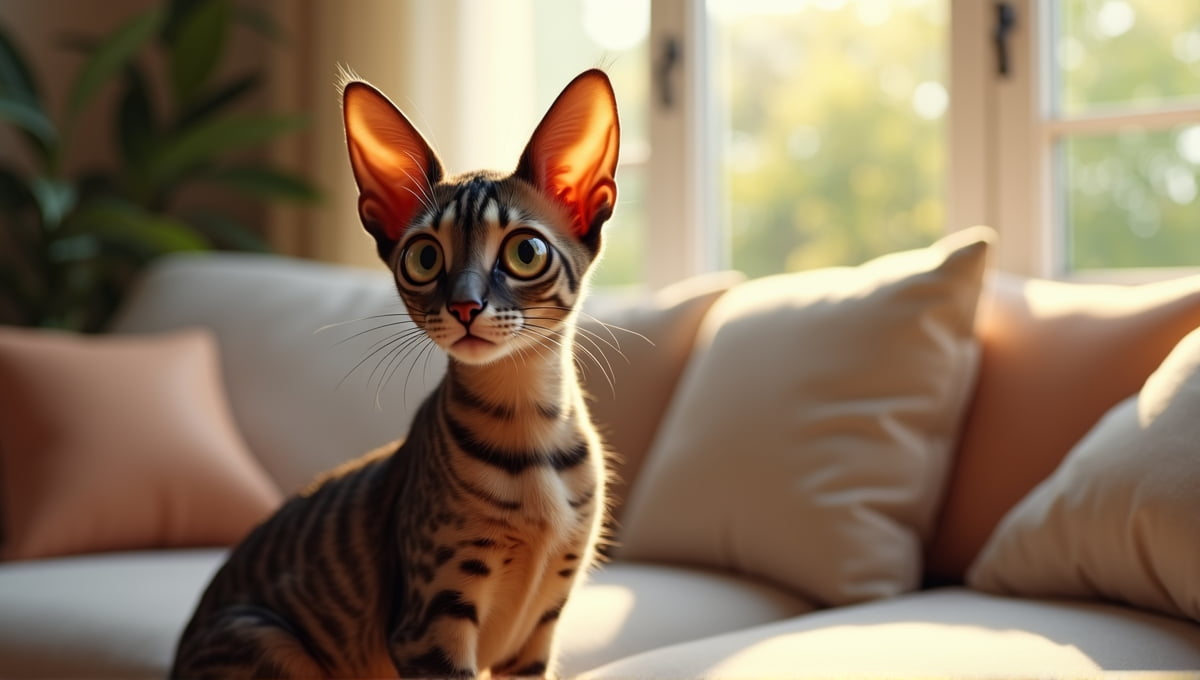Exotic cats are intriguing to me. I’ve witnessed many owners face challenges with their special socialization requirements. Socialization is paramount to these cats with wild spirits. It’s not just about turning them into friendly cats.
You’re essentially molding the cat’s personality and behavior. So, how do you properly socialize exotic cats? Inside, I share the methods to build a strong, happy relationship with your exotic cat.
Understanding Exotic Cat Socialization
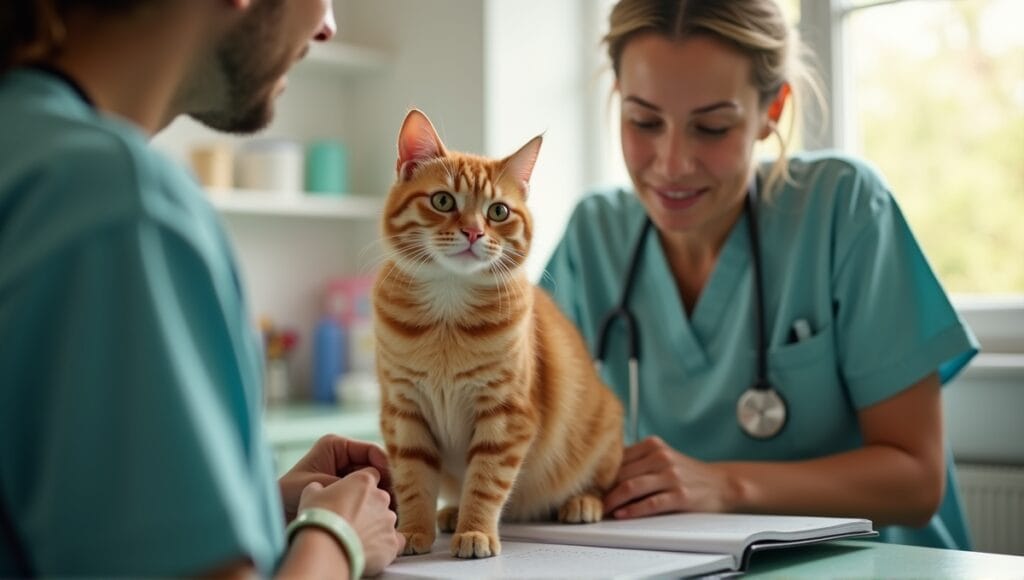
Exotic cat breeds are not your typical domestic house cat, and they require different socialization methods. I’ve worked with various cat breeds over the years, and I can tell you that working with an exotic cat is an entirely different challenge.
Exotic cats are non-domestic or hybrid feline species, and they have unique socialization requirements that domestic house cats do not have. Proper socialization is essential for the cat’s happiness and your safety.
Socializing an exotic cat is difficult because it still has many of its wild instincts. Many exotic cats are unpredictable and may pose a safety risk due to their size and strength. Unlike domestic cats, an exotic cat may not naturally want to be around humans.
Before you consider a wild cat, you must consider the legal aspects:
- Check your local laws and regulations about owning a wild cat.
- Obtain any necessary permits or licenses to legally own the cat.
- Make sure your enclosures (if you keep the cat outdoors) meet the legal requirements.
- Find a qualified veterinarian who has experience working with wild cats.
Owning an exotic cat is a massive responsibility, and it requires a significant amount of knowledge, time, and resources. You are responsible for the cat’s physical and mental well-being for the entirety of its life.
Exotic Cat Species and Their Social Behaviors
There are many different species of exotic cats. Some of the most common exotic cats kept as pets are servals, bengal cat, savannahs, and caracals. Each species of exotic cat has unique social behaviors.
In the wild, most exotic cats are solitary animals and only come together to mate. In contrast, domestic cats can form social groups. Understanding these basic instincts is crucial when socializing exotic cats.
Many exotic cats have different social needs than domestic cats. They require more space and mental stimulation, as well as more opportunities to use their hunting instincts. Additionally, some exotic cats may not seek affection in the same way domestic cats do.
You also need to understand the social quirks of that exotic cat species. For example, servals are a high-energy cat that needs access to vertical space. Bengals, meanwhile, often enjoy water, which is rare among domestic cats. Knowing these quirks also allows you to tailor your socialization efforts.
The Socialization Window for Exotic Cats
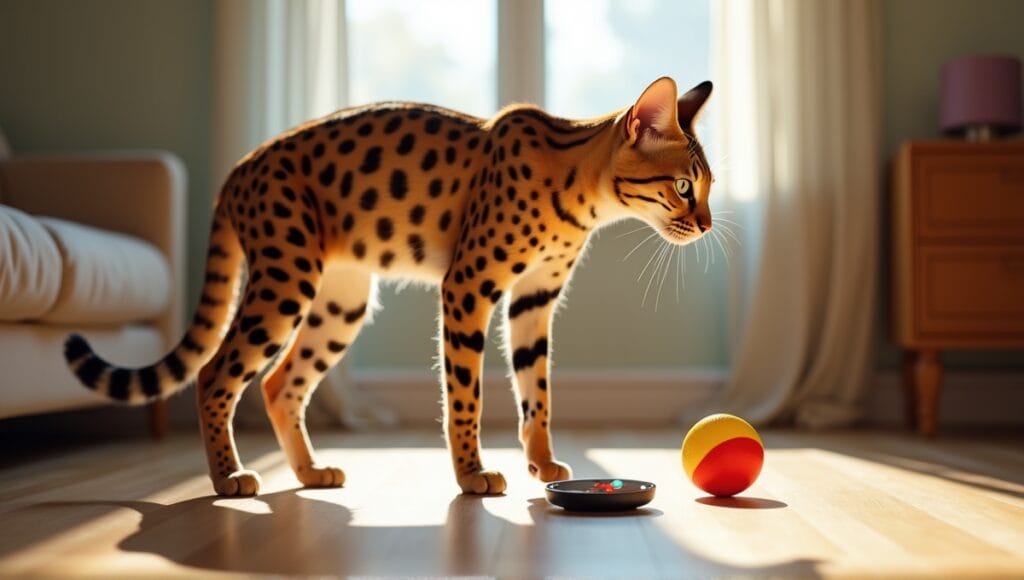
Timing is key to socializing exotic cats. Kittens have a critical socialization window at 2-7 weeks of age. Within this time frame, they are most receptive to socialization.
As kittens, socializing after 8-10 weeks becomes more difficult, but it’s still possible. While it’s still feasible, optimizing older exotic cats in a socializing capacity is more difficult. You can socialize older cats, but it requires more patience.
The adult exotic cat socialization strategy involves a lot of gradual exposure and positive associations. It’s a slower strategy, and you’ll need to be consistent and understanding.
To successfully socialize, ensure the cat receives consistent human interaction:
- Spend time with the cat daily
- Handle the cat gently and use a soft voice
- Give the cat treats after each handling session
- Always respect the cat’s comfort level and never push it beyond what’s comfortable
However, keep in mind each cat is an individual. Some cats will take to socialization sooner than others, so remain patient and persistent.
Creating a Comfortable Environment for Exotic Cat Socialization
The right environment is also key to exotic cat socialization. These animals require a lot of space, so they won’t do well in a small apartment.
Create an enclosure that resembles the cat’s natural habitat and provide climbing structures, perches, and hiding places. Additionally, incorporate toys that activate their hunting instincts and puzzle feeders to offer mental stimulation.
The cat should also have safe spaces throughout the enclosure. These cats get stressed easily, so they need places to hide. You can also use adaption to their environment to make it feel like their natural habitat:
- Natural materials like wood and stone
- If the species enjoys water features, add them
- Different terrain with various textures
- Temperature and humidity control
- Overall, ensure the cat feels safe and has mental stimulation in the space, and you’ll
- set yourself up for socializing successfully.
Introducing Exotic Cats to Humans
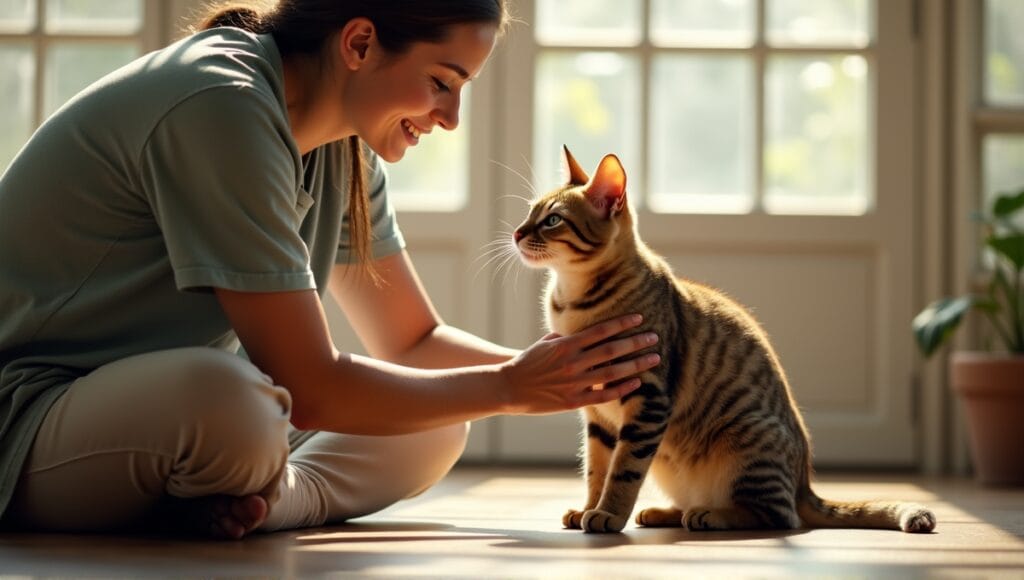
Introducing exotic cats to humans is delicate work. Always approach with a calm, confident energy. Avoid sudden movements and loud noises.
Earning trust will take time. Keep interactions short and sweet. Allow the cat to come to you. Use treats and toys to help the cat form positive associations with you.
You’ll need to become an expert at reading exotic cat body language. If the ears are pinned back, the pupils are dilated, or the tail is twitching, the cat is stressed or angry. Respect its space.
Slowly introduce your exotic cat to new people and environments. Start with quiet, calm people. Slowly increase the volume of voices and activity. Always watch these interactions closely.
Remember that socializing your exotic cat is a marathon, not a sprint. Be patient and allow your cat to be in control. Your patience will reward you with a stronger relationship and a more confident cat.
Socializing Exotic Cats with Other Pets
Introducing an exotic cat to other pets requires careful planning, as not all exotic cats can live safely with other animals. Evaluate the compatibility of other pets with the exotic cat based on the other pets’ species and individual personality.
When introducing pets, use the appropriate techniques. For example, start with scent swapping: Allow pets to smell each other’s bedding/toys. Then, gradually allow them to see each other through a barrier.
Always supervise interactions between an exotic cat and other pets, and never leave them unsupervised together, even if they appear to get along. Your top priority should be to keep everyone safe.
- Size differences between exotic cats and other pets pose a risk.
- Prey drive may be triggered by smaller pets.
- First, territorial conflicts can emerge.
- Even if nothing goes wrong, stress can prompt an exotic cat to develop healthproblems or behavior problems.
To mitigate these risks, give pets separate spaces, eliminate bad feelings, and know when to separate pets (in a separate location). If inappropriate behavior still continues, consider hiring an exotic animal behavior consultant.
Positive Reinforcement Methods for Exotic Cat Socialization
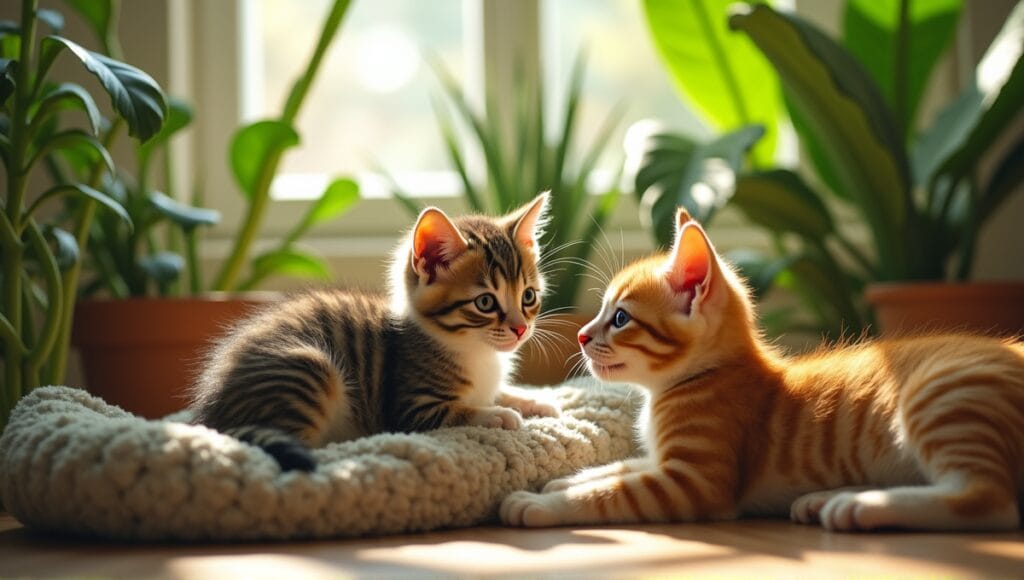
Positive reinforcement is the best training technique for exotic cats. This involves simply rewarding a behavior to encourage the behavior to be repeated.
Many exotic cats are highly food motivated, making food rewards the best option. Use small pieces of their favorite treats. Some may also work for praise, petting, or play. Experiment to see what most motivates your cat.
Clicker training is an effective training method to try with exotic cats. You use the clicker to mark the exact moment your cat does the behavior you want. Then, immediately reward the behavior. The clicker provides very clear communication to the cat, helping it understand what you want.
Target training is when you train a cat to touch a specific target. This can be helpful for guiding the cat to do certain behaviors. Start with the cat simply touching the target with its nose, then you can make the behavior more complex and from further away.
The key to training exotic cats is just to be consistent. Set aside time for regular training sessions. Keep these short and make them a game. Always end on a high note. With whom patience, you can make progress on the cat’s behavior and socialization.
Addressing Behavioral Issues in Exotic Cats
Poorly socialized exotic cats may develop behavioral issues. These issues can be caused by fear, stress, and lack of mental stimulation.
Common behavioral issues include aggression, excessive scratching or marking, and other destructive behaviors. These stem from the cat’s natural instincts conflicting with captive life.
When addressing these behavioral issues, first determine why the cat is misbehaving. Is it stressed? Bored? Feeling threatened? Once you know why, you can take the appropriate action to fix it.
When to get professional help:
- Aggressive behaviors don’t resolve
- Self injurious behaviors
- Severe fear or anxiety
- Continued inappropriate elimination
Keep in mind that behavioral problems in exotic cats can be complex. If you’re really struggling, don’t hesitate to contact an exotic animal behaviorist. They can offer specific advice tailored to your cat.
Health Considerations During Exotic Cat Socialization

Regular veterinary checkups are also important for exotic cats. Look for a vet who has experience with your specific exotic species. You can then bring your cat to the vet to ensure it remains healthy throughout the socialization process.
Socializing your cat can pose health risks. For example, stress can weaken your cat’s immune system. Additionally, introducing your exotic cat to a new environment or other animals could expose it to parasites or illnesses. Therefore, watch your cat closely for any signs of illness during socialization.
Vaccinations and parasite control are also important. Therefore, talk to the vet about a health plan for your exotic cat. Some vaccines that domestic cats receive are also essential for exotic cats.
Watch for signs of stress or illness while socializing your exotic cat. This includes changes in the cat’s eating or litter box habits. It might also groom itself excessively, hide, or become aggressive. If you notice any of these signs, stop the socialization process and consult the vet.
Ensuring your cat is healthy is critical to successfully socializing it. A healthy cat will feel more confident and positively interact with its environment and companions.
Long-Term Socialization Maintenance for Exotic Cats
Socializing isn’t something you do once and then check off your list. It’s a continuous activity throughout your cat’s life. Even previously socialized cats can revert to being feral if they don’t have contact with humans for an extended period.
As your cat gets older, you may need to adjust your socialization activities. For example, senior cats may have lower energy levels or develop health problems, so just adapt the activities to fit their changing abilities and energy levels.
Building a relationship is a consistent effort. You need to spend dedicated time with your exotic cat on a daily basis. This doesn’t have to be anything specific. You can groom your cat, play with your cat, or just hang out with your cat. Make this time enjoyable and allow your cat to set the boundaries.
Regular mental and physical stimulation:
- Introduce new toys and rotate them.
- Use feeding puzzles.
- Create climbing and exploring opportunities.
- Consider clicker training to provide mental stimulation.
Again, the main idea is to keep your exotic cat mentally and physically stimulated. This ensures they stay socialized and happy throughout their life.
Case Studies: Successful Exotic Cat Socialization
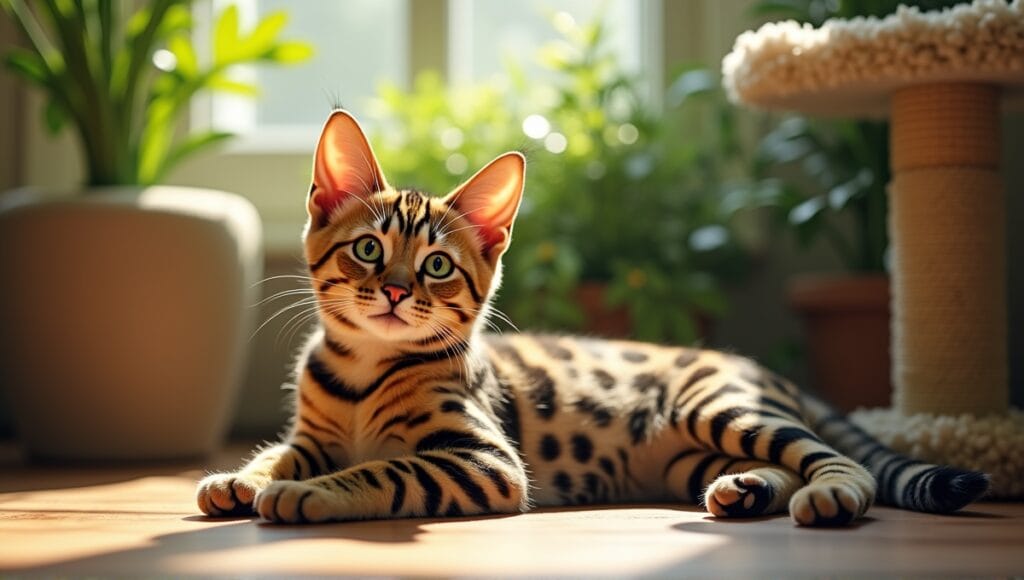
I’ve witnessed incredible transformations in exotic cats through proper socialization. For example, Luna is a serval that arrived at our facility extremely afraid of humans. However, with patience and consistently positive human interactions, she became confident and affectionate.
Exotic cat owners also commonly encounter other challenges. For instance, one Bengal cat owner struggled with the cat’s high energy and destructive behavior. However, by providing plenty of climbing structures and daily interactive playtime, they were able to redirect the cat’s energy.
Advanced handlers stress the importance of earning the cat’s respect through consistency. They’ve become very good at interpreting subtle body language cues and adjusting their strategy. This level of awareness is critical to earning an exotic cat’s trust.
Proper socialization also has a significant impact on an exotic cat’s overall quality of life. Well-socialized cats experience less stress, are more interactive with enrichment activities, and form stronger bonds with their owners. It’s a very gratifying process that improves both the cat’s life and the owner’s life.
If you’re considering an exotic cat as a pet, it’s important to understand that they require special care and attention. Some low-maintenance cat breeds might be a better option for those who are new to cat ownership or have limited time for pet care.
Wrapping Up
Socializing exotic cats is a challenging, but ultimately rewarding experience. It takes a lot of patience, some education, and commitment. After all, each cat is different. What you think they need one exotic cat may not apply to another. The most important thing is to establish a routine early and stick to it while keeping the cat’s best interest at heart at all times. I’ve personally witnessed how socialization can completely change an exotic cat’s life. You’re not just taking care of a pet. You’re raising a wild soul and developing an incredible relationship.



